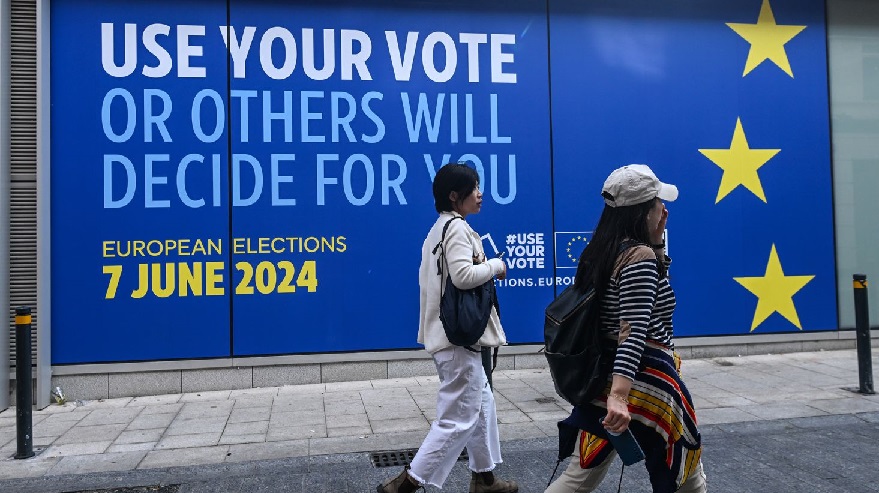Europe is already deciding who will represent its citizens in the European Parliament for the next five years.
In terms of mobility, political parties are trying to convince voters with new proposals ranging from postponing the ban on the sale of combustion cars to increasing fines for entering low-emission zones in large cities.
Since 1979, Members of the European Parliament (MEPs) have been directly elected by citizens from different European Union (EU) countries.
It is worth mentioning that in the Parliament, political parties do not organise by nationality, but rather according to their ideological affinity.
Currently, there are seven political groups in the Parliament where most elected officials are registered, although some choose not to join any and are part of the non-attached members’ group.
In terms of mobility, energy, and industry, the automotive sector reveals the dispute between different political groups through the proposals they present to attract voters.
The PP advocates for maintaining combustion
The Popular Party advocates postponing the ban on the sale of combustion engine cars that the European Commission – under the presidency of Ursula von der Leyen, from the same political family – wants to impose from 2035.
They state that the ban should be implemented once “electrification in Spain” is achieved with sufficient coverage across the country, ensuring the accessibility of electric vehicles (EVs) for families.
Furthermore, they believe that the European Commission and the heads of state and government of the 27 EU countries must “take more decisive steps” to ensure that the infrastructure for charging EVs in Europe is adequate.
The PP is also concerned about the competitive crisis that China might trigger, although in this regard, they limit their efforts to mitigating the disparities between Chinese brands and traditional European manufacturers.
In another area, the party led by Alberto Núñez Feijóo aims to create regulations to ensure the maintenance and good condition of Spain’s highways and motorways, promising to deploy a network connecting the Iberian Peninsula with the rest of the EU.
The PSOE calls for more fines for non-compliancce
The proposals presented by the Spanish Socialist Workers’ Party (PSOE) focus on “ensuring compliance with the climate, environmental, and social commitments derived from the European Green Deal.”
They will ask Europe, according to their program, for more affordable and sustainable public transport.
They place special emphasis on promoting the Atlantic Corridor, rural areas, and the Mediterranean.
Regarding pollution, in order to comply with existing commitments, they advocate the “polluter pays” principle, providing tax incentives or penalties for companies that do not meet their climate targets.
Additionally, they call for fines for cities that do not implement Low Emission Zones (LEZs) and meet the criteria to do so, such as having more than 50,000 inhabitants, which applies to about 150 cities.
Vox wants to reverse the agreements
In the case of VOX, the leadership aims to reverse the European Green Deal and the 2030 Agenda, thereby maintaining combustion cars beyond 2035 and 2050.
In general, they want to end any measures that “criminalise” the automotive industry.
SUMAR wants to advance the targets
Sumar’s electoral program includes advancing the reduction of pollutant gas emissions to 2040.
Specifically, they propose reducing the emissions of member states by 65 per cent by 2030, instead of the 55 per cent currently stipulated.
The coalition led by Yolanda Díaz looks to the German example and wants to create a European flat rate for public transport to facilitate travel between EU countries, while also calling for investment in infrastructure.
Through the instrument of sustainable urban mobility plans, they aim to deploy a network of bicycle lanes and personal mobility vehicle lanes in all cities across Europe, reversing the prohibitions in some cities on the continent.
PODEMOS talks about taxation and electric vehicles
Podemos advocates for increasing the presence of electric cars and making them more affordable through better taxation, including reductions in the registration tax for electric (already the case in Spain) and hybrid vehicles.
The goal is to achieve a 25 per cent market share for EVs next year and up to 70 per cent by 2030, aiming for a completely ‘green’ fleet by the early 2040s.
The party, represented by Irene Montero, believes that public transport should be made cheaper and aims to make it free for those under 26 years old across Europe, covering both national and intra-EU travel.
Within cities, Podemos believes that the maximum speed limit should be 30 kilometres per hour on all streets.
Through a European directive, they want cities with more than 50,000 inhabitants and companies with more than 100 employees to establish mobility plans that “include routes, access, and alternative transportation to private cars.”
Additionally, for road transport, they propose a European Emissions Reduction Programme to promote electric and alternative fuel trucks.







